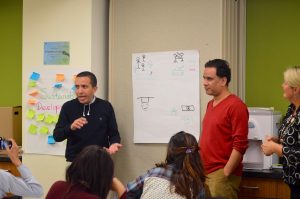-
What We Do
- WHERE WE WORK
-
About Us
 Welcome Message from Carol Jenkins
Welcome Message from Carol JenkinsFor more than 90 years, World Learning has equipped individuals and institutions to address the world’s most pressing problems. We believe that, working together with our partners, we can change this world for the better.
On my travels, I’ve had the opportunity to meet with many of those who have joined us in this mission. In Baghdad, we’ve trained more than 2,300 Iraqi youth who are already giving back at home. In London, our partners in the TAAP Initiative strongly believe that we are all responsible to practice inclusion. And in Vermont, our Experiment in International Living and School for International Training participants prove every day that they have the tools and the determination to change the world.
Please join us in our pursuit of a more peaceful and just world.
- Get Involved
Media Center > Story
Engaging Youth in Jordan
July 27, 2017
Youth engagement in Jordan is a top priority for Ahmad Fayez Ajarmeh.
He is the head of the Project Management Unit in the Ministry of Political Development and Parliamentary Affairs in Jordan, and he is passionate about civil society and engagement.
Last year he participated in the Leaders for Democracy Fellowship, a U.S. Department of State-funded exchange program run by the non-profit World Learning, which brings young professionals from the Middle East and North Africa (MENA) to the U.S. to help them develop leadership skills and develop projects to implement back in their home country.
Ajarmeh says 2017 is a pivotal year for Jordan because of forthcoming municipal elections and the enactment of a 2015 bill that gives more autonomy to local councils. The new law will allow anyone over the age of 25 to run for local office.

Expanding local governance is a way to engage with youth and women, explains Ajarmeh.
“It’s important to give young people an opportunity to be active in their communities and make a positive change in their community.”
In his role in the ministry, Ajarmeh worked with E.U. organizations, and he realized he needed to become better acquainted with organizations in the U.S. too.
“I needed to enrich myself with the American experience because I heard a lot about democracy, civil society organizations’ work, and political parties’ work in the U.S.,” he says.
During the fellowship, Ajarmeh interned at the International Foundation for Electoral Systems (IFES) in Washington, DC, where he published a research paper about Jordan’s upcoming municipal elections and outlined way to facilitate participation for youth, women, and disabled people both as voters and candidates.
In Jordan, Ajarmeh plans to offer training in public speaking and campaign management to youth and women candidates.
He says another benefit of the LDF program was meeting other emerging leaders across the MENA region.
“We face many common challenges in our region and I think the best way to deal with these challenges is to sit together and discuss our problems and find ways to solve them to better our community,” adds Ajarmeh.





